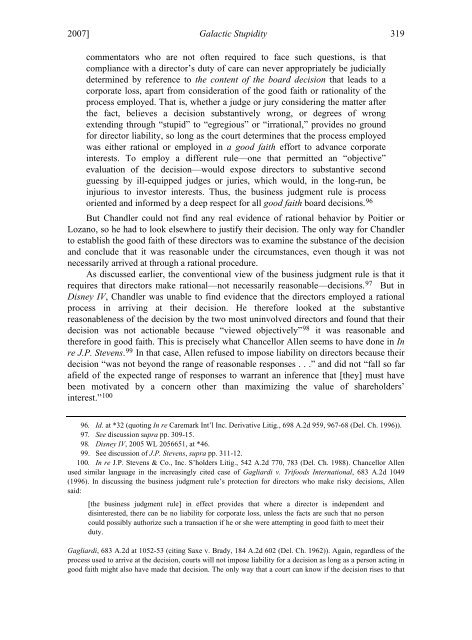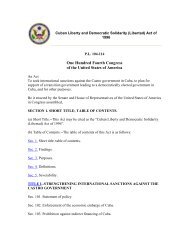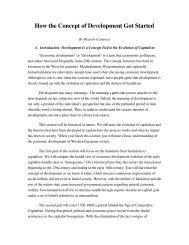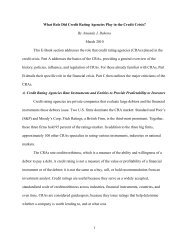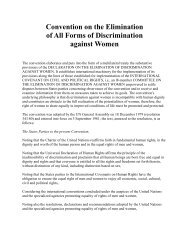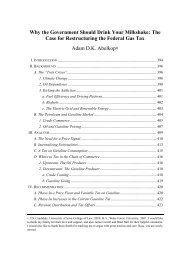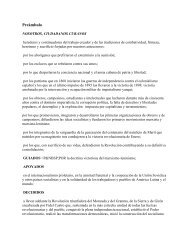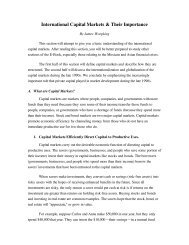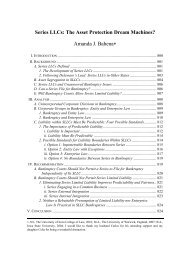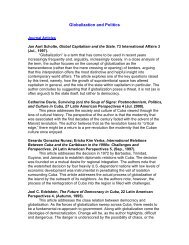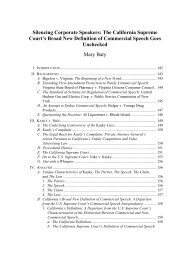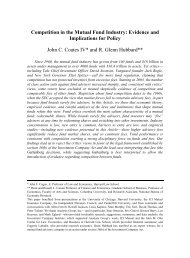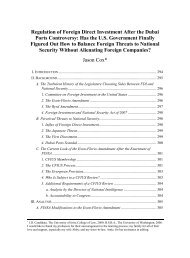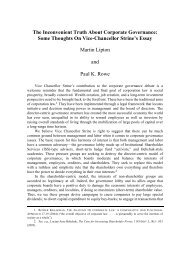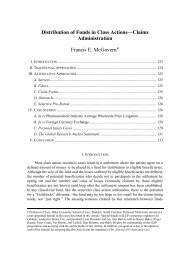Galactic Stupidity and the Business Judgment Rule - College of Law
Galactic Stupidity and the Business Judgment Rule - College of Law
Galactic Stupidity and the Business Judgment Rule - College of Law
Create successful ePaper yourself
Turn your PDF publications into a flip-book with our unique Google optimized e-Paper software.
2007] <strong>Galactic</strong> <strong>Stupidity</strong> 319<br />
commentators who are not <strong>of</strong>ten required to face such questions, is that<br />
compliance with a director’s duty <strong>of</strong> care can never appropriately be judicially<br />
determined by reference to <strong>the</strong> content <strong>of</strong> <strong>the</strong> board decision that leads to a<br />
corporate loss, apart from consideration <strong>of</strong> <strong>the</strong> good faith or rationality <strong>of</strong> <strong>the</strong><br />
process employed. That is, whe<strong>the</strong>r a judge or jury considering <strong>the</strong> matter after<br />
<strong>the</strong> fact, believes a decision substantively wrong, or degrees <strong>of</strong> wrong<br />
extending through “stupid” to “egregious” or “irrational,” provides no ground<br />
for director liability, so long as <strong>the</strong> court determines that <strong>the</strong> process employed<br />
was ei<strong>the</strong>r rational or employed in a good faith effort to advance corporate<br />
interests. To employ a different rule—one that permitted an “objective”<br />
evaluation <strong>of</strong> <strong>the</strong> decision—would expose directors to substantive second<br />
guessing by ill-equipped judges or juries, which would, in <strong>the</strong> long-run, be<br />
injurious to investor interests. Thus, <strong>the</strong> business judgment rule is process<br />
oriented <strong>and</strong> informed by a deep respect for all good faith board decisions. 96<br />
But Ch<strong>and</strong>ler could not find any real evidence <strong>of</strong> rational behavior by Poitier or<br />
Lozano, so he had to look elsewhere to justify <strong>the</strong>ir decision. The only way for Ch<strong>and</strong>ler<br />
to establish <strong>the</strong> good faith <strong>of</strong> <strong>the</strong>se directors was to examine <strong>the</strong> substance <strong>of</strong> <strong>the</strong> decision<br />
<strong>and</strong> conclude that it was reasonable under <strong>the</strong> circumstances, even though it was not<br />
necessarily arrived at through a rational procedure.<br />
As discussed earlier, <strong>the</strong> conventional view <strong>of</strong> <strong>the</strong> business judgment rule is that it<br />
requires that directors make rational—not necessarily reasonable—decisions. 97 But in<br />
Disney IV, Ch<strong>and</strong>ler was unable to find evidence that <strong>the</strong> directors employed a rational<br />
process in arriving at <strong>the</strong>ir decision. He <strong>the</strong>refore looked at <strong>the</strong> substantive<br />
reasonableness <strong>of</strong> <strong>the</strong> decision by <strong>the</strong> two most uninvolved directors <strong>and</strong> found that <strong>the</strong>ir<br />
decision was not actionable because “viewed objectively” 98 it was reasonable <strong>and</strong><br />
<strong>the</strong>refore in good faith. This is precisely what Chancellor Allen seems to have done in In<br />
re J.P. Stevens. 99 In that case, Allen refused to impose liability on directors because <strong>the</strong>ir<br />
decision “was not beyond <strong>the</strong> range <strong>of</strong> reasonable responses . . .” <strong>and</strong> did not “fall so far<br />
afield <strong>of</strong> <strong>the</strong> expected range <strong>of</strong> responses to warrant an inference that [<strong>the</strong>y] must have<br />
been motivated by a concern o<strong>the</strong>r than maximizing <strong>the</strong> value <strong>of</strong> shareholders’<br />
interest.” 100<br />
96. Id. at *32 (quoting In re Caremark Int’l Inc. Derivative Litig., 698 A.2d 959, 967-68 (Del. Ch. 1996)).<br />
97. See discussion supra pp. 309-15.<br />
98. Disney IV, 2005 WL 2056651, at *46.<br />
99. See discussion <strong>of</strong> J.P. Stevens, supra pp. 311-12.<br />
100. In re J.P. Stevens & Co., Inc. S’holders Litig., 542 A.2d 770, 783 (Del. Ch. 1988). Chancellor Allen<br />
used similar language in <strong>the</strong> increasingly cited case <strong>of</strong> Gagliardi v. Trifoods International, 683 A.2d 1049<br />
(1996). In discussing <strong>the</strong> business judgment rule’s protection for directors who make risky decisions, Allen<br />
said:<br />
[<strong>the</strong> business judgment rule] in effect provides that where a director is independent <strong>and</strong><br />
disinterested, <strong>the</strong>re can be no liability for corporate loss, unless <strong>the</strong> facts are such that no person<br />
could possibly authorize such a transaction if he or she were attempting in good faith to meet <strong>the</strong>ir<br />
duty.<br />
Gagliardi, 683 A.2d at 1052-53 (citing Saxe v. Brady, 184 A.2d 602 (Del. Ch. 1962)). Again, regardless <strong>of</strong> <strong>the</strong><br />
process used to arrive at <strong>the</strong> decision, courts will not impose liability for a decision as long as a person acting in<br />
good faith might also have made that decision. The only way that a court can know if <strong>the</strong> decision rises to that


